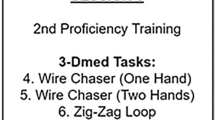Abstract
Background
This study was undertaken to establish the value of the Advanced Dundee Psychomotor Tester (ADEPT) as an objective real-time scoring system, correcting for subjective assessor opinion on endoscopic task performance. The main research questions were as follows:
-
⊙ Are surgeons good estimators of their own performance on ADEPT?
-
⊙ Do surgeons perceive ADEPT to be a valid instrument for measuring laparoscopic skills?
-
⊙ Does performance on ADEPT reflect innate psychomotor ability?
Methods
Each of 45 surgeons completed two runs on ADEPT. The runs comprised five standardized tasks. A posttest visual analog scaled (VAS) questionnaire measuring attitude toward skills testing in general, validation, and performance on ADEPT was used. Subjective responses were compared with objective scores generated through performance on ADEPT.
Results
Surgeons emphasize the importance of using a variety of training methods for surgical residents during their residency, including laparoscopic virtual reality simulators. Monitoring of residents’ endoscopic progress seemed to be a key issue. Surgeons themselves underestimate their individual performance on ADEPT (mean subjective score of 6.1 vs mean objective score of 6.6). Self-reported performance on ADEPT is unreliable because confidence intervals between the VAS score and the ADEPT score overlap. Surgeons disagree on the validity of ADEPT. The mean score for validity was 5.8, ranging from 0 to 10 with almost equal distribution over the scale. Innate ability established as surgeons’ scores express is high concordance between test run and true run, with 72.7% of the participants’ true run score within one distance from the test run.
Conclusions
Surgeons cannot correctly predict their standardized individual test result on ADEPT. Performance on ADEPT reflects innate psychomotor ability along with improvement over runs. Surgeons are ambivalent in assessing the validity of ADEPT, irrespective of personal performance.
Similar content being viewed by others

References
Derossis AM et al. (1998) Development of a model for training and evaluation of laparoscopic skills. Am J Surg 175: 482–487
Fleishman E (1996) Acquisition of skill, Academic Press, New York pp 147–167
Francis N, Hanna GB, Cushieri A (2001) Reliability of the Advanced Dundee Endoscopic Psychomotor Tester for bimanual tasks. Arch Surg 136: 40–43
Gallagher A, Crothers I, Satava R (2001) Comprehensive objective assessment of fundamental skills for laparoscopic surgery. In 9th International Congress of the European Association for Endoscopic Surgery, Maastricht, The Netherlands
Gantert WA, et al. (2001) The “virtual patient”: a VR simulator for training in laparoscopic surgery: initial experience in a training course. In: 9th International Congress of the European Association for Endoscopic Surgery Maastricht, The Netherlands
Grantcharov TP, et al. (2001) Virtual reality computer simulation: an objective method for the evaluation of laparoscopic surgical skills. Surg Endosc 15: 242–244
Haluck R, K, TM (2000) Computers and virtual reality for surgical education in 21st Century. Arch Surg 135: 786–792
Hamdorf JM, Hall JC (2001) Acquiring surgical skills. Br J Surg 87: 28–37
Hanna, GB, et al. (1998) Computer-controlled endoscopic performances assessment system. Surg Endosc 12: 997–1000
Hanna GB, Cushieri A (1999) Influence of the optical axis-to-target view angle on endoscopic task performance. Surg Endosc. 13: 371–375
Hanna GB, Drew T, Clinch P (1996) A microprocessor-controlled psychomotor terster for minimal access surgery. Surg Endosc 10: 965–969
Hanna GB, Drew T, Cushieri A (1997) Technology for psychomotor skills testing in endoscopic surgery. Semin Laparosc Surg 4: 120–124
Hanna GB, Shimi S, Cushieri A (1997) Influence of direction of view, target-to-endoscope distance, and manipulation angle on endoscopic knot tying. Br J Surg 84 1460–1464
Hyltander A, Rhodin P, Liljegren E (2001) Virtual reality training skills can be transferred to the operating room: a prospective and randomized study. In: 9th International Congress of the European Associating for Endoscopic Surgery, Maastricht, The Netherlands
Macmillan AI, Cushieri A (1999) Assessment of innate ability and skills for endoscopic manipulations by the Advanced Dundee Endoscopic Psychomotor Tester: predictive and concurrent validity. Am J Surg 177: 274–277
Satava M, GA, MJ (2001) Reliability and validity of the minimally invasive surgical trainer virtual reality system. In: 9th International Congress of the European Association for Endoscopic Surgery, Maastricht, The Netherlands
Smith CD, Stubbs J, HD (1998) Simulation technology in surgical education: can we assess manipulative skills and what does it mean to the learner. In: Medicine meets virtual reality: art, science, technology: healthcare (R) Evolution. In: Wesjtwood JD, et al. IOS Press and Ohmsa pp 379–380
Szalay D, et al. (2000) Using operative outcome to assess technical skill. Am J Surg 180: 234–237
Author information
Authors and Affiliations
Additional information
Online publication: 5 March 2002
Rights and permissions
About this article
Cite this article
Schijven, M.P., Jakimowicz, J. & Schot, C. The Advanced Dundee Endoscopic Psychomotor Tester (ADEPT) objectifying subjective psychomotor test performance. Surg Endosc 16, 943–948 (2002). https://doi.org/10.1007/s00464-001-9146-y
Received:
Accepted:
Issue Date:
DOI: https://doi.org/10.1007/s00464-001-9146-y



